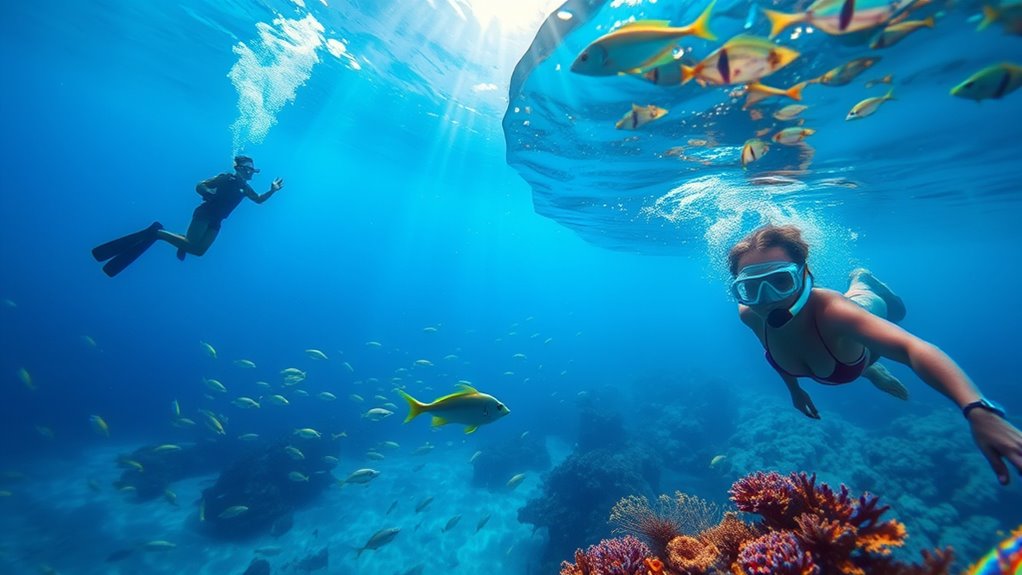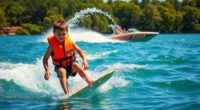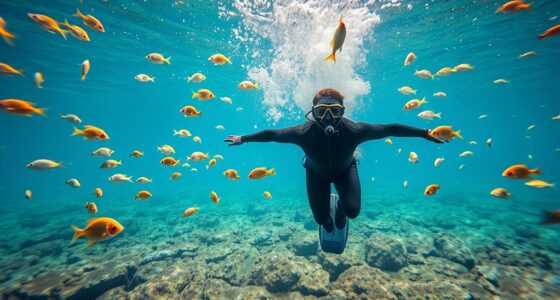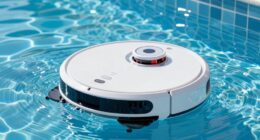Free diving and snorkeling offer unique underwater experiences. Snorkeling’s easy to pick up, requiring minimal gear like a mask and fins, perfect for beginners. You float on the surface while observing shallow marine life. In contrast, free diving demands more skill and specialized equipment, allowing you to dive deeper and interact with marine life more intimately. It’s immersive and requires breath-hold techniques for deeper exploration. Interested in discovering more about these water activities?
Key Takeaways
- Snorkeling requires minimal gear, while free diving needs specialized equipment for deeper dives, including wetsuits and weight belts.
- Snorkeling is beginner-friendly with little training needed, whereas free diving demands mastery of breath-hold techniques and physical fitness.
- Snorkeling primarily occurs at the surface, allowing for short descents, while free diving facilitates deeper exploration of underwater environments.
- Snorkeling offers a relaxed experience focused on surface observation, while free diving provides an immersive connection with marine life and the ocean.
- Risks of snorkeling are minimal, whereas free diving involves managing breath and fitness, necessitating training for safety during deeper dives.

Whether you’re exploring vibrant coral reefs or simply enjoying the tranquility of the ocean, both free diving and snorkeling offer unique experiences. While they may seem similar, each activity has distinct qualities that cater to different preferences and skills. Understanding these differences can help you choose which experience suits you best, making your time in the water even more enjoyable.
When it comes to snorkeling, you’ll find it’s relatively easy to get started. All you need is a mask, snorkel, and fins. The equipment requirements are minimal, which makes snorkeling accessible for everyone, from beginners to seasoned adventurers. You’ll float on the surface, using your snorkel to breathe while observing the underwater world below. This relaxed approach means you can spend hours enjoying the sights without any major training or preparation. You can dive down briefly for a closer look, but it’s usually a short descent since you’re primarily staying on the surface.
On the other hand, free diving requires a different level of commitment. You’ll need to master breath hold techniques to dive deeper and stay underwater longer. This skill is essential for enjoying the full range of underwater experiences, as it allows you to explore more than just the surface. Unlike snorkeling, where you can pop up for air at any moment, free diving challenges you to manage your breath effectively. This means practicing to extend your breath holds and learning how to relax your body while submerged. You’ll also need specialized equipment, including a wetsuit, weight belt, and fins designed for free diving, which can make it a more involved process.
The thrill of free diving lies in the deeper connection to the ocean. You’re not just observing; you’re immersing yourself in the underwater environment. You’ll have the opportunity to swim with marine life at varying depths and experience the serenity of being fully submerged. This can be incredibly rewarding but does require a level of training and physical fitness that snorkeling doesn’t demand. Additionally, both activities can expose participants to potential security vulnerabilities related to equipment safety and personal well-being.
Frequently Asked Questions
Can I Free Dive Without Any Prior Experience or Training?
You shouldn’t free dive without prior experience or training. It’s essential to learn breath hold techniques and proper dive planning to guarantee your safety underwater. Without training, you risk shallow water blackout or other dangers. Consider taking a course to understand the basics and build your skills gradually. This way, you’ll enjoy the experience while minimizing risks and maximizing your enjoyment of the underwater world. Safety always comes first!
What Type of Gear Is Necessary for Snorkeling?
For snorkeling, you’ll need a few essential pieces of gear to enhance your experience. A good snorkel mask is key to clear visibility underwater, while fins help you glide effortlessly through the water. Depending on the water temperature, a wetsuit can keep you warm and comfortable. Imagine gliding alongside colorful fish, feeling the thrill of the ocean around you, all made possible by your trusty gear. It’s an adventure waiting to happen!
Are There Age Restrictions for Free Diving or Snorkeling?
There aren’t strict age restrictions for snorkeling, but kids should be supervised. For free diving, many organizations set minimum age requirements, usually around 12-15 years, depending on certification levels. You’ll need to meet specific certification requirements if you want to dive deeper or take courses. Always verify with local regulations and instructors to guarantee safety and compliance, so you can enjoy your underwater adventures with peace of mind.
How Do Weather Conditions Affect Free Diving and Snorkeling?
When it comes to weather, it can totally impact your free diving or snorkeling experience. Stormy skies or high winds can stir up the water, decreasing visibility and making it tough to spot marine life. On a clear, calm day, you’ll enjoy better conditions, allowing you to fully appreciate the underwater beauty. So, check the forecast before you head out; it’ll make a world of difference in your adventure!
Is It Safe to Free Dive Alone?
No, it’s not safe to free dive alone. You need a buddy for equipment safety and to monitor each other’s well-being underwater. Diving solo increases risks, like blackout or equipment failure, and an unresponsive diver can face serious consequences. Additionally, consider the environmental impact; if something goes wrong, it could harm marine life or damage ecosystems. Always prioritize safety and have a partner with you to enhance the experience and ensure you both stay safe.
Conclusion
In the end, free diving and snorkeling are two distinct journeys beneath the waves. Think of snorkeling as a gentle caress of the surface, where you float like a leaf on water, absorbing the beauty around you. Meanwhile, free diving is a profound plunge into the ocean’s embrace, where you become one with the depths, exploring the hidden treasures below. Each offers its own thrill, inviting you to choose your adventure and discover the underwater world in your own way.










